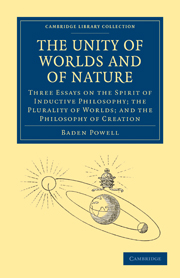 The Unity of Worlds and of Nature
The Unity of Worlds and of Nature Summary
On Inductive Reasoning
The well-known passage in which Aristotle analyses the logical nature of inductive proof, and its relation to syllogism, is confessedly not only obscure, but seems to involve a contradiction, especially in his contrasting syllogism and induction in one place, and yet showing that induction may be reduced to syllogism in another. The difficulties of the case have been elaborately discussed by Dr. Whewell. Aristotle's view is simply reducible to this, — that when an inductive argument is put into the form of a syllogism, it necessarily involves, as the major premise, the assumption that all objects of the kind, of which some are enumerated are like those enumerated in the particular respect specified. With this assumption formally introduced, the syllogism is perfect in point of form. This is exactly what is pointed out by Archbishop Whately. Or, in other words, it amounts to saying that the argument of induction cannot be reduced to a syllogistic form except by formally making this assumption.
The only real question involved is, as to the means of arriving at the truth of this assumption. But it is a main consideration often overlooked, that the truth of the premises, or the source whence we derive them, is, in the language of logicians, a matter wholly “extra dictionem,” and with which the syllogistic theory, as such, is no way concerned.
- Type
- Chapter
- Information
- The Unity of Worlds and of NatureThree Essays on the Spirit of Inductive Philosophy; the Plurality of Worlds; and the Philosophy of Creation, pp. 513 - 556Publisher: Cambridge University PressPrint publication year: 2009First published in: 1856
